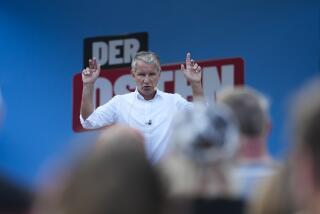GERMANY : Social Democrats Tire of Losses, Try New Faces : The opposition party sweeps out the old guard, putting its faith in a fresh--but untested--leadership.
- Share via
BONN — After losing three straight general elections over the last decade, Germany’s opposition Social Democrats have turned to new, largely untested faces to lead them to power by the mid-1990s.
The surprise election this week of 54-year-old Hans-Ulrich Klose, the party treasurer and former Hamburg mayor, to the pivotal job of party parliamentary leader completed a cleaning out of the old guard and an attempt to bring new blood into the party hierarchy.
The move was part of a larger generational change under way in Bonn that has also touched Chancellor Helmut Kohl’s Christian Democrats.
Klose replaces Hans-Jochen Vogel, 65, the former party chairman. Vogel’s lackluster showings in organizing the Bundestag opposition in the parliamentary debates following the collapse of the Berlin Wall helped give the Social Democrats the image of a party that was deeply divided internally and out of touch with the public mood.
Vogel gave up the party chairmanship last May to Bjoern Engholm, 51, the popular minister-president of the northernmost state of Schleswig-Holstein but a man untested as a national figure.
The initial impact of the changes has been marginal, with political observers believing that the Social Democrats have gathered as many question marks as new faces.
Six months after his appointment as party chairman, for example, Engholm has projected the image of an affable champagne socialist, better known for his friendly smile than tough, credible leadership.
Klose admitted as much in a candid interview on the party’s problems shortly after he was chosen parliamentary floor leader.
“Bjoern Engholm must above all else find his role as a party chairman, something he can probably only really do after he’s won reelection in Schleswig-Holstein,” said Klose. That election is scheduled for next spring.
Klose himself is an uncertain figure: He began his term as mayor of Hamburg in the mid-1970s with the reputation as a party moderate, but he became a voice of the far left before resigning in 1979.
Earlier this year, however, Klose was among a minority of Social Democrats who strongly supported the allied action in the Persian Gulf War.
Opinion polls indicate that the new leadership’s first task will be to add credibility to popularity.
A survey conducted last week by the German television network ZDF showed the Social Democrats ahead of Kohl’s Christian Democrats, 40% to 37%, among voters who were asked which party they “like best.”
But the Social Democrats trailed by a similar 3 percentage points when the question was which party people would actually vote for.
While the next election is probably three years away, the Christian Democrats are also beginning to look ahead.
Later this month, Interior Minister Wolfgang Schaeuble, 49, is scheduled to become the Christian Democrats’ parliamentary floor leader, replacing 71-year-old Alfred Dregger, in a move that makes him Kohl’s likely heir-apparent.
However, with Kohl only 61 and one year into a four-year term, no one expects a change soon.
Schaeuble, despite last year’s assassination attempt that left him partially paralyzed and confined to a wheelchair, has remained a powerful, popular figure in the party.
More to Read
Sign up for Essential California
The most important California stories and recommendations in your inbox every morning.
You may occasionally receive promotional content from the Los Angeles Times.











